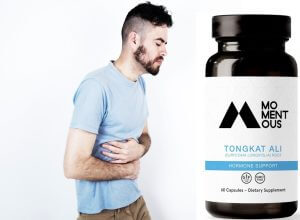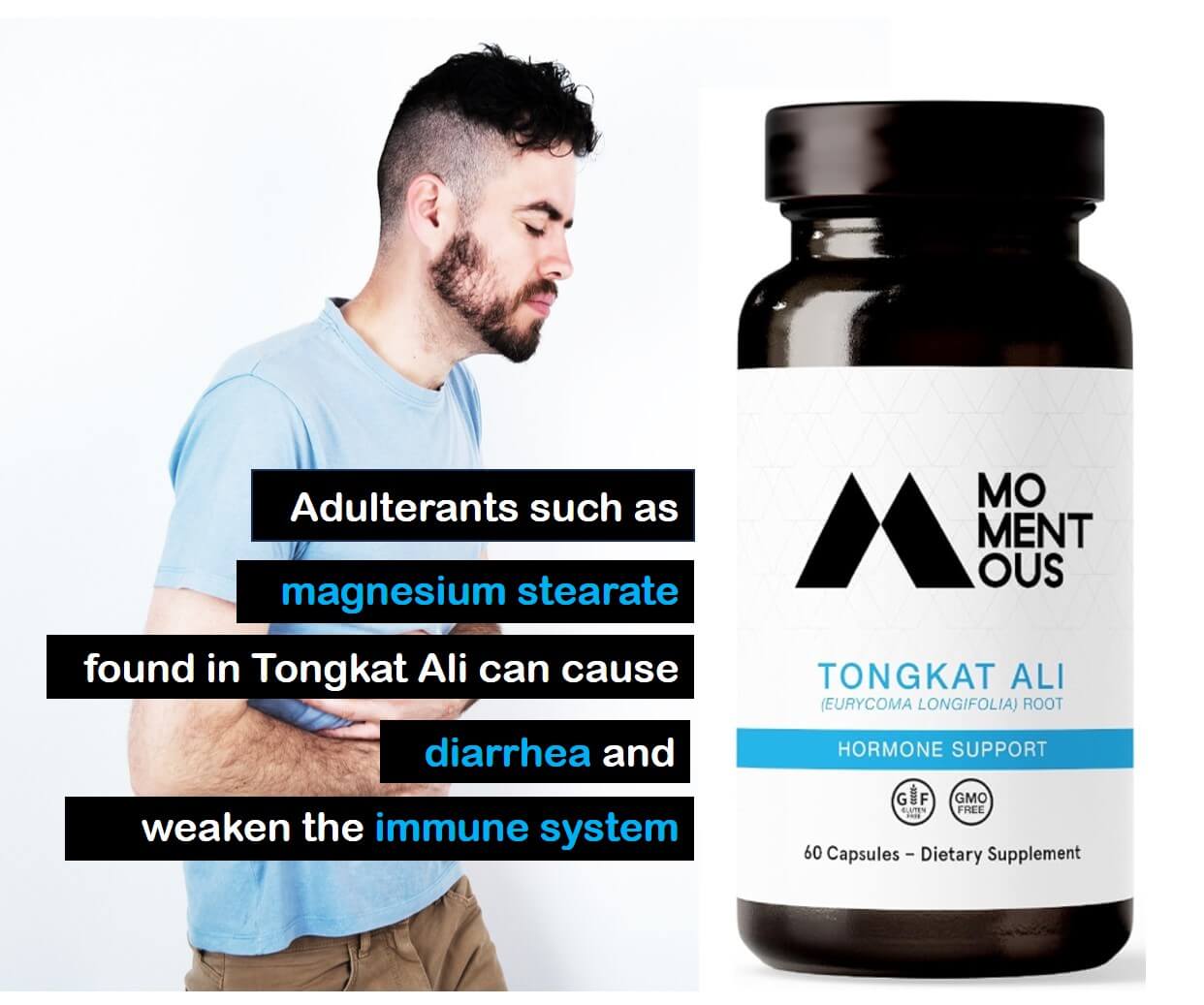

Adulterants, contaminants, allergens, and impurities are major causes of Tongkat Ali side effects. Adulterants may be added or used as solvents to Tongkat Ali extract by manufacturers, but excessive addition of adulterants may increase the likelihood of Tongkat Ali side effects and cause more risks.
In this article, we shall focus on the major causes of Tongkat Ali’s side effects to help you understand the root cause and prevent the risks from happening.
In general, there are two potential causes of Tongkat Ali side effects:
What will be covered in the article:
Adulterants are substances (i.e binders, fillers, synthetic drugs, allergens and pesticides) that are found or intentionally added to Tongkat Ali extract with the intent to deceive, artificially enhance or lower its quality.
Adulterants found in Tongkat Ali are a major cause of side effects such as nausea, vomiting, severe heart palpitations, acute hallucinations, rashes, and skin allergies.
Depending on the type of adulterants used in Tongkat Ali extract, it could cause long term health risks.
"Adulterants not only dilute the therapeutic value of herbal supplements but also have the potential to cause harm. The herbal industry must commit to rigorous testing and quality assurance protocols to maintain the purity and efficacy of Tongkat Ali."
Shahid Shayaa, Founder of AKARALI

Types of adulterants, impurities and contaminants that may be found in some Tongkat Ali supplements:
Binders is a form of solvent, often used as an anti-caking agent, or to prevent the Tongkat Ali powder from clumping due to changes in humidity and temperature. Binders such as magnesium stearate are used in most Tongkat Ali supplements in the US and UK.
The addition of adulterants such as magnesium stearate in Momentous Huberman Tongkat Ali poses health risks if taken long term or in higher-doses.
Huberman Tongkat Ali contains magnesium stearate, a chemical compound known to irritate the mucus lining of the bowels, triggering diarrhea and cause potential of weakening of the immune system.
Some Tongkat Ali manufacturers add inexpensive fillers during production to increase their volume, weight or aid in the encapsulation process. Adding excessive fillers such as maltodextrin (rice flour) found in major Tongkat Ali supplements is not good for your blood sugar levels.
Fillers can be substances like starch, rice powder, or other inert materials. The addition of excessive fillers can dilute the bioactive ingredients of Tongkat Ali, reducing its effectiveness.
Maltodextrin is extremely bad for metabolism because it lacks nutritional value and may also spike your blood sugars.
Avoid buying Tongkat Ali supplements with high filler content which are sold at lower prices. Brands such as Solaray 400mg Tongkat Ali may be affordable and cheap, but less potent and may not deliver any health benefits due to excessive amount of maltodextrin and low bioactive compounds.
In some cases, Tongkat Ali supplements may be adulterated with synthetic drugs (i.e sildenafil, tadalafil, steroids, sibutramine), which are pharmaceutical compounds not naturally found in plants.
Manufacturers may add these drugs to mimic the effects of the herbal ingredients or enhance the product’s perceived efficacy.
Amazon has introduced new requirements for Tongkat Ali supplements to be adulterant tested by independent bodies such as EUROFINS.
Always purchase Tongkat Ali from reputable global brands that adhere to Tongkat Ali manufacturing quality standards such as MS2409.
Adulterant test is crucial to ensure Tongkat Ali supplements are free from:
Selective androgen receptor modulators (SARMs):
Anabolic Steroids:
Stimulants:
However, these synthetic drugs can pose serious health risks, especially if the consumer is unaware of their presence or potential side effects.
Tongkat Ali supplements may contain allergens such as gluten, soy, dairy, or nuts from shared production line. Allergens can be problematic for individuals with known allergies or sensitivities which cause adverse Tongkat Ali side effects.
Avoid buying Tongkat Ali supplements which is manufactured from shared food production assembly line.
Cross-contamination of allergens can occur during manufacturing if the supplements are processed in facilities that handle allergenic ingredients.
This is a common problem with contract manufacturing facilities in the USA as they share the same production line with other food products, herbal supplements, etc.
Tongkat Ali supplements sourced from plants grown in polluted areas or contaminated soils, can contain heavy metals like lead, mercury, arsenic, or cadmium. Indonesian Tongkat Ali grown near mining areas in Kalimantan have higher mercury and arsenic, which can be highly toxic, unsafe for human consumption and damaging to health.
Avoid buying Indonesian Tongkat Ali supplements due to excessive high heavy metals (mercury and arsenic) and lack of regulatory controls by the authorities.
These heavy metals may accumulate in Tongkat Ali plants and pose health risks such as Drugs Induced Liver Injury (DILI) when consumed over a long period or in high-doses.
The Food Drugs Administration (FDA) has set a limit of mercury content in food and dietary supplement not exceeding 0.05 p.p.m
On this note, Malaysian Tongkat Ali is relatively safer with few side effects compared to Indonesian Tongkat Ali and consumers are advised to check the source ingredient and country of origin when buying Tongkat Ali supplements in the US or UK.
If herbs used in supplements are not properly cultivated and tested, they may be contaminated with residues of pesticides or herbicides used during farming.
The pesticide-free Tongkat Ali plants, or wild Tongkat Ali (that are harvested in the rainforests) are a safer option.
These chemical residues can be harmful to human health if ingested regularly.
Allergy is one of the main causes of Tongkat Ali side effects. Before consuming Tongkat Ali, please check if you have an inherent or undiagnosed allergy to alkaloids.
Tongkat Ali is not suitable if you have an allergic reaction to alkaloids. Although this allergic reaction is rare but can still occur when your immune system mistakenly identifies alkaloids as harmful substances and triggers an immune response.
Alkaloids are naturally occurring chemical compounds found in various plants such as coca, belladonna plant, nightshade plants (egg plants, tomatoes, peppers) – and can have diverse effects on the human body.
When someone with an allergy to alkaloids comes into contact with these substances, their immune system releases histamine and other chemicals, leading to allergic symptoms.
Common symptoms of an allergic reaction to alkaloids may include:
Seek emergency medical help if you, or someone else you’re with has a severe allergic reaction. Don’t wait to see if the symptoms go away.
If you have an attack and you carry an epinephrine autoinjector, administer it right away. Even if symptoms improve after the injection, you still need to go to an emergency room to make sure symptoms don’t recur, even without more exposure to the allergen. This second reaction is called biphasic anaphylaxis.
Make an appointment to see your provider if you or your child has had a severe allergy attack or signs and symptoms of anaphylaxis in the past.
If you suspect an allergy to alkaloids, quassinoids or other major allergic reactions after consuming Tongkat Ali, it’s important to consult with a healthcare professional or allergist for proper diagnosis, advice, and management of your condition. They can help identify the specific allergens and recommend appropriate treatment or avoidance strategies.
Based on the European Food Safety Authority (EFSA) report, the allergen screening test by ELISA and PCR analysis did not detect any of form of allergens or cross‐allergenicity in Tongkat Ali. In addition, no allergic reactions to Tongkat Ali have been reported in Malaysia since its approved use by the Ministry of Health.
However, there are still risks of allergic reaction if the Tongkat Ali supplement is exposed to allergens during the encapsulation or filling process that may happen in the manufacturing facility. Consumers who are allergic to alkaloids or hormone-sensitive are cautioned against buying low-quality Tongkat Ali supplements from unreputable brands in the US to avoid any side effects from allergens.
To mitigate the risk of adulteration or allergy reaction, it’s advisable to choose clinically tested Tongkat Ali supplements from trusted brands. This will minimize any unwanted side effects. However, the severity of Tongkat Ali side effects vary from one person to the other.
Also please look out for Certificate of Analysis (COA), or third-party testing certifications from reputable lab facilities such as EUROFINS, and consult healthcare professionals or pharmacists for guidance when selecting and using herbal products.
Ask our experts on Tongkat Ali adulterants, contaminants and impurities.

Naressa Khan contributes regularly on AKARALI and is part of the global Tongkat Ali research team. As a writer and journalist, Naressa specializes in nutrition, health supplements, and natural wellness. With this approach always in mind, she explores fact-based and scientific evidence of topics related to health, herbs and natural wellness.
Our articles are third party reviewed by our panel of experts and medical advisors to ensure the facts are accurate and credible. These are validated against multiple source references which include but not limited to research studies, peer-reviewed journals, pre-clinical studies, clinical tests and other credible publications.
Our panel of medical advisors and experts are highly experienced in their individual fields. However, they do not provide any medical advice or recommendations arising from content published in this article.
Disclaimer: The content published in this article is for educational purposes and not intended to provide any form of recommendations, directly or indirectly to purchase or consume herbal supplements, drugs, medications, alternative remedies and practices or any brands mentioned in this article. By reading this, the sole responsibility and decision lies on the reader to make an informed decision based on publicly available information published on the internet. Any herbal supplements can be used as a health supplement, dietary plan or to treat illnesses. However, we encourage you to consult your nearest doctor before making any purchase from this website or any other websites or social platforms after reading this article. We do not hold any responsibility or accountability for any products purchased from this website or any third-party websites that are linked to this articles, sales channels or social platforms.